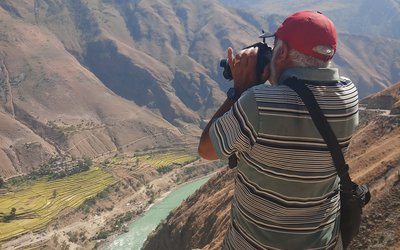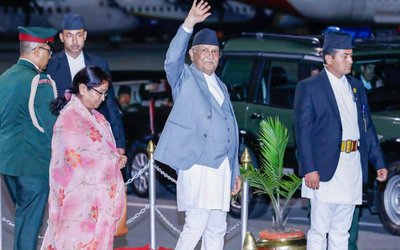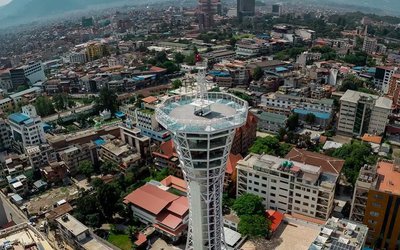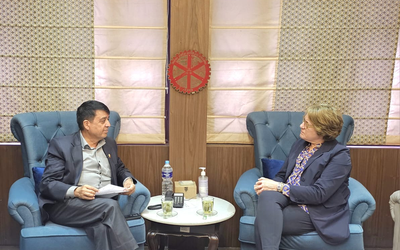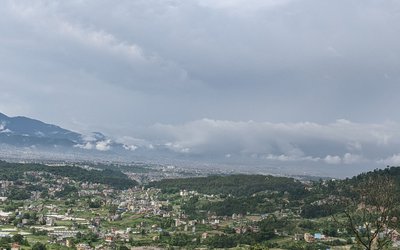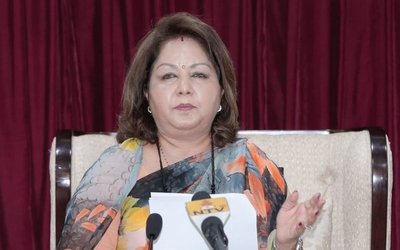Nepal has launched a process to formulatean Implementation Plan (IP) for the Third Nationally DeterminedContribution (NDC3)by organising a workshop on 28-29 July 2025 in Kathmandu. Nepal prepared its NDC3 within six months through series of consultations. It was started by organising a 3-day workshop on 22-24 December 2024 in Nagarkot and finalised after sharing the draft NDC3 in 7 Provinces.The government approved it on 14 May, launched by the Prime Minister on 16 May during Sagarmatha Sambad, and communicated to the UNFCCC Secretariat on 19 May 2025. The NDC3 IP is expected to finalise through series of consultations by December 2025.
Article 4.2 of the Paris Agreement provisions for preparing, communicating, and maintaining successive NDCs. Parties to this Agreement should communicate updated NDC every five years. Paris Agreement also provisions for Global Stocktake (GST) every five years. The first GST held at Dubai during CoP 28 informed Parties to further reduce GHG emissions to limit the temperature rise to well below 2 0C.
Till early 2016, 195 countries submitted the Intended NDC to the UNFCCC Secretariat, 197 countries submitted their first NDC (NDC1) while being a Party to the Paris Agreement, and 151 Parties submitted updated NDC1 (second NDC) to the Secretariat. By July 2025, 21 Parties have communicated their NDC3. Nepal communicated its INDC on 4 February 2016, NDC1 on 5 October 2016, NDC2 on 8 December 2020, and NDC3 to the UNFCCC Secretariat on 19 May 2025.
The NDC1prioritisedadaptation actions. A roadmap for NDC1 implementation was drafted in 2018.The Ministry of Forests and Environment (MoFE) - climate change focal point of Nepal - prepared an ambitiousNDC2 (2021-2030) with commitments to GHGs emissions reductionsubject to the availability of funding. The NDC2 committed, inter alia, to prepare and implement climate-resilient and gender-responsive adaptation plans in all 753 local levels by 2030. A total of USD 25 billion was estimated to achieve the conditional mitigation targets with an additional USD 3.4 billion for unconditional targets. The costof adaptation actions was considered as per the National Adaptation Plan (NAP, 2021-2050). The NDC2 IP was approved on 1 August 2023 and was unveiled by the then Rt. Hon. Prime Minister during the National Climate 'Summit' on 21 November 2023 along with the NAP. The NDC2 IP includes an action agenda for the 2023-2030 period on energy, transport, AFOLU (agriculture,forestry and other land uses), wastes, industrial processes and product use (IPPU), including urban settlements, and GESI. The NDC2 IP proposed to constitute a multi-stakeholder High-level Climate Change Steering Committee under the chair of the Minister for Forests and Environment for oversight and policy guidance. It estimated USD 33.04 billion on 2023 price to implement the IP. It took nearly 3 years to prepare and approve the NDC2 IP.
The NDC3 is highly ambitious with several mitigation targets for 2030 and 2035 on: (i) energy (electricity generation and supply, cooking and heating, transport, and industry; (ii) AFOLU; (iii) waste; and (iv) IPPU. The NDC3 also includes targets on policies and measures on the above four areas, including WASH, education, water resources, health, urban and rural settlements, and tourism.Nepal adopted an ICTU (information to facilitate clarity, transparency and understanding) frame to prepare the NDC3. In addition to mitigation targets, NDC3 includes several adaptation priorities in sectors as mentioned in the National Climate Change Policy (2019) and the NAP with three overarching targets namely: (i) prepare integrated gender-responsive Local Adaptation Plans of Action (LAPA) in all 753 local governments by 2035; (ii) localise and integrate adaptation into local government's planning processes by 2035; and (iii) carry out sectoral vulnerability and risk assessment (VRA) in all administrative, physiographic and ecological regions by considering the best available climate science by 2030. Furthermore, Nepal's NDC3 includes several actions on loss and damage. The NDC3 estimates a total of USD 73.74 billion (14.68% unconditional and 85.32% conditional) for quantified mitigation targets and does not estimate costs for non-quantified mitigation policies and measures. Of the total cost, over USD 65 billion is allocated for the energy sector. Role of capacity building and technology transfer is highlighted to achieving its targets. The NDC3 considers co-benefits, just transition and human rights, GEDSI, and governance. The NDC3 was prepared through extensive multi-stakeholder consultations at national and province levels. Over 1,000 people might have physically attended in its preparation process.
Within a month of communicating the NDC3 to the UNFCCC Secretariat, MoFE started preparatory work to formulate NDC3 IP by organising a consultation programme with the development partners, NGOs and experts on 18 June 2025. Dr. Rajendra P. Mishra, Secretary of the Government of Nepal, currently at MoFE chaired the programme. Mr. Naresh Sharma, Under-Secretary (Technical) at the Climate Change Management Division (CCMD) shared the lessons learnt and challenges of NDC2 IP by focusing, inter alia, on issues related to mainstreaming it into national budget and planning processes, and flow of climate finance. Mr. Sharma informed that NDC3 IP formulation process will stocktake the progress of NDC2 IP, mainstream it into national planning & budgeting processes, map climate finance, demonstrate climate rationale, and ensure concrete measures to track climate actions and finances.The MoFE will take overall responsibility to formulate the NDC3 IP and thematic ministries will led and coordinate sector level IPs. He expressed satisfaction on high rating of Nepal's NDC3 abroad. Participants voiced to analysing the state of implementation of the NDC2 IP, help sector ministries to led sector IPs formulation process, and align with the existing plans and programmes at all levels. From the chair, Dr. Mishraemphasized to, inter alia, align integration of NDC3 targets with the sectoral plans and programmes, engage private sector, and finalise theme-based IPs and consolidated NDC3 IP by December 2025.
With the key objectives of examining implications of NDC3 on Nepal's economy, IIDS organised a workshop in Kathmandu on 9 May 2025 and shared its preliminary findings. The study informs NDC3 targets well-aligned with climate and development goals,and it would be a strong driver of economic development for GDP gains, job creation and poverty reduction, if implemented effectively.
The MoFE-CCMD organised a workshop on 27-28 June 2025 in Godavari to develop a term of reference (ToR), workplan, and worksheets to start the NDC3 IP formulation process with participation from government institutions, development partners, NGOs and experts. Hon. Ain Bahadur Shahi Thakuri, Minister for Forests and Environment highlighted the success of the Sagarmatha Sambad and outlined priority climate actions, including the development of a regulatory framework on carbon trade. Hon. Thakuri believed NDC3 IP a defined 'destination' to meet national commitments and international obligations on climate change. The technical presentations and working groups discussions produced the ToR, workplan and worksheets under the continued facilitation and high-level of dedication of Mr. Naresh Sharma to produce a meaningful outcome.
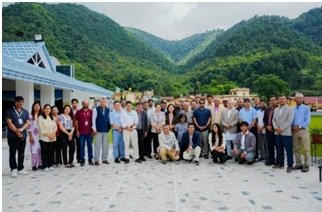
Godavari workshop: 27-28 June 2025
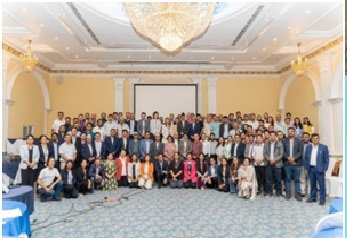
Budhanilkantha workshop: 28-29 July 2025
On 28-29 July 2025, MoFE organised a workshop on NDC3 IP with participation of senior government officers and concerned officials from relevant ministries, commissions and departments, and representatives from development partners,NGOs and other organisations to officially start the NDC3 IP formulation process. Under the chair of Dr. Rajendra Prasad Mishra, Secretary at MoFE, the opening session was addressed by: (i) Mr. Eaknarayan Aryal, Chief Secretary, Government of Nepal; (ii); Dr. Maheshwar Dhakal, Chief of CCMD; (iii) Ms. Hanaa Singer-Hamdy, UN Resident Representative in Nepal; (iv) Ms. Kyoko Yokosuka, UNDP Resident Representative in Nepal; and (v) Mr. Manjeet Dhakal, Climate Analytics South Asia Director, including the chair's remark.
Speakers raised concerns, issues, and opinions in the opening session which are related to: (i) realising vulnerability to climate change and its serious impact to local communities, groundwater depletion in Madhesh Province,ecological concerns in Chure areas, and need for translating NDC3 targets into actionsas per long-standing national and international commitments on climate change; (ii) stressing on climate justice and international compensation, approaching strategically on advocacy for climate justice and compensation from high-emission countries, and the role of Local level in mainstreaming and intensifying climate actions to build adaptive capacity with inclusive and effective participation of stakeholders; (iii)intensifying shared responsibility andcontinued support of3-tiers of government,private sector, and NGOs in implementing climate actions; (iv) aligning climate investments with national priorities and working collectively to make the IP practical, doable, and deeply rooted in the national economic and social development, including the 2030 agenda for sustainable development; (v) understanding strong foundation for shifting focus from planning to implementation to achieve the NDC3 targets with 'whole-of-government' and the 'whole-of-society' approach; (vi) acknowledging the coordinated efforts among the UN agencies in Nepal to advance for transforming climate vision and ambitionsinto tangible actions through an inclusive multi-stakeholder process; (vii) reaffirmingUNDP's commitment to support climate actions and additional support for stakeholder's consultations, technical assessments, reviews, and assist in setting sectoral targets in areas of energy, industry and GEDSI; (viii) accelerating climate actions through a well-structured IPto achieve net-zero GHGs emissions by 2045 by mobilisingclimate finance, utilising climate technologies, and building capacity; (ix) realising technology transfer, international collaboration, and resource mobilisationto achieving NDC3 targets and for inclusive and low-carbon development; (x) serving as a global climate leader as NDC3 is a model for climate ambition, rooted in 'strong ownership of sector ministries, inclusive stakeholder engagement, targets grounded by climate science, and informed by 1.5 0C pathway and the outcome of the first Global Stocktake'; and (xi) ensuringstrong climate rationale in project proposals to access climate finance.
The July workshop provides guidance to formulating the NDC3 IP through collective and coordinated effects of the government ministries and departments, with effective participation of NGOs, and development partners. Continuation of multi-stakeholder consultative process, guided by the 'leave-no-one-behind' approach, is expected to develop a 'Nepalised', practical, and doable IP with time bound, realistic source-based budget,inspiredleading and supporting organisations, along with workable governance, and meaningful coordination for 2026-2035 decades.
For previous updates on NDC

Batu Uprety
Former Joint-Secretary and Chief of Climate Change Management Division, Ministry of Environment (then), and former Team Leader, National Adaptation Plan (NAP) formulation process. E-mail: upretybk@gmail.com
- Understanding the Supplementary EIA
- Jul 27, 2025
- Approval Of EIA-Related First And Last Reports At Once
- Jun 14, 2025
- Two Calls For Climate Action From Kathmandu
- May 21, 2025
- Teaming up Climate Change Negotiation
- Apr 18, 2025
- Sagarmatha Sambad: Likely Bearing the Fruits
- Mar 27, 2025

